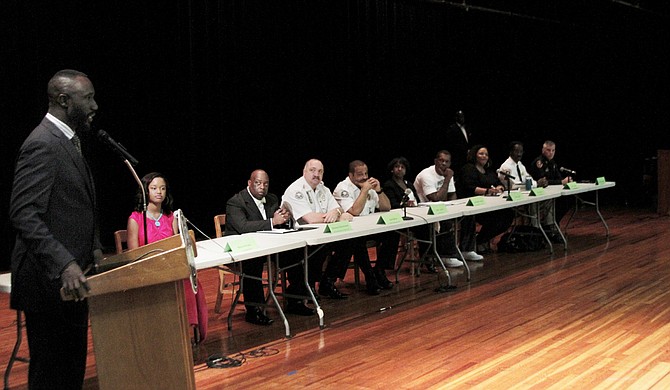The mayor’s forum on community and police schisms in Jackson highlighted the work still to do on relations between the two cultures. Photo by Tim Summers Jr..
JACKSON — Members of the community, including law-enforcement leaders, met July 28 at Murrah High School to participate in Mayor Tony Yarber's "Us and Them" forum focusing on the relationship between the public and police.
Mayor Yarber addressed the crowd first, telling the assembled citizens that when he was young he was told how to handle the police, including an air of caution.
"To be honest with you, I had the same conversation with my son," Yarber said, adding that the need to have "the talk" with his own son is telling for the continuing distrust between the police and the black community. "But what it says is that there is still a need to have a conversation with our young people and our people in the community about how we interact with the police and law enforcement."
Othor Cain, host of the radio show by the same name, moderated the panel. Cain said that with the violence between police and citizens in Baton Rouge and Dallas over the last month, discussion of the issues remained crucial to keeping the peace, even in Jackson. He said some people could not imagine a similar event occurring in Jackson.
"I submit to you that it absolutely could," Cain said. "I bet in other parts of the country they thought the same thing."
Defining the Problem
Cain started the forum by asking the police officers on the panel to address what they thought is at the source of the conflict and tension in the nation. Maintaining connections is the key to building relationships between police and the public for Hinds County Sheriff Victor Mason, whose background includes time as a juvenile-justice officer.
"You can't stay locked up in the office all the time," Mason said, recalling his time as a juvenile officer, visiting with the youth in his community.
"If I didn't see you at your school, I saw you at your church," Mason said. "That's one of the things that helped me understand where young people were coming from."
Mason said he was the product of a single-parent household and, as a result, tries to connect with young people in similar situations.
"I have a lot of empathy for that. It bothers me when I see a 14-year-old in jail for armed robbery," he said, adding that it adds to the situation when the single parent has to worry about a house full of children.
"I think that once we get out of the cars and go to the houses and talk to them, that will begin the healing process. If we don't have that direct communication with the family ... we will never get anywhere," Mason said.
Jackson Police Department Chief Lee Vance referred to Ferguson, Mo., stating that it is never good "to put everyone in the same basket."
"It is the result of a culture that probably existed there for a long time. If there is no relationship between law enforcement and the community then those types of ill feelings will fester," Vance said.
"And quite frankly we have to discuss the fact that race has been an issue in this country since its inception."
"If you are wise, you must adopt a community-policing concept," Vance said. "We don't want to be seen as invading armies."
Vance deemed the "national rhetoric" as essentially divisive, separating the community from the police.
"If you are in a police culture that allows abuse, then that will manifest itself," Vance said, stating that his department takes an active approach against abuse. "If you are in the police culture that despises abuse, then the community will trust you. Because that is all it is, trust and respect."
The Community Perspective
John Knight, a community activist and former drug dealer, said it will take time for the neighborhoods in Jackson to heal the bonds between themselves and law enforcement.
"The thing is, when you see another person get beat up by the police, or slammed down on his face for a traffic ticket, or no driver's license or because he didn't answer a certain question, that make you have a little strife towards a police officer," Knight said.
"That's what the problem is in Jackson community with police officers."
"It takes time and dedication to actually get our trust back," Knight said at the forum. "You have to have a bond with the community."
Maisie Brown, a 14-year-old activist and incoming freshman at Jim Hill High School, said she agreed with Knight.
"This distrust of police in the African American community did not just start when Trayvon Martin was killed in cold blood," Brown said, reminding the audience of the actions police departments took in the South during the civil-rights era.
"It really starts in our community, teaching our family members to gain trust because that is the only way to heal the years of damage that have been done to us."
Email city reporter Tim Summers Jr. at [email protected]. See more local news at jfp.ms/localnews.
More like this story
More stories by this author
- DA Smith Wins on One Count, But Passes on 'Whistleblower' Bad Check Claims
- Mayor Yarber, Socrates Garrett Address Contracting Dispute, 'Steering'
- UPDATED: Jury Finds Allen Guilty for Cell-phone Payment, Not Guilty on Nine Counts
- Allen Trial: Defense Rests After Making Case DJP Doesn’t Collect 'Taxes’
- DJP Board Attorney Gibbs Takes Stand to Defend Ben Allen's Actions



Comments
Use the comment form below to begin a discussion about this content.
comments powered by Disqus